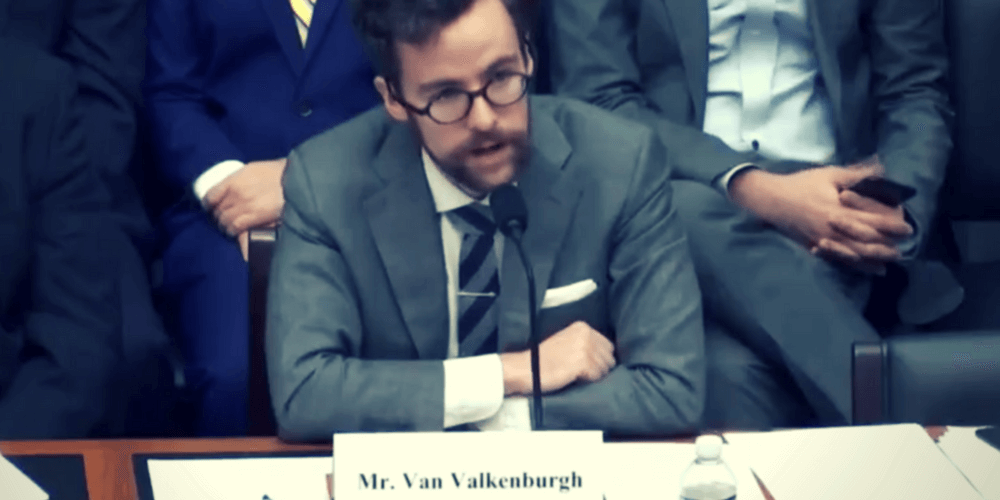
The Capital Markets, Securities, and Investments Subcommittee of the United States House of Representatives Financial Services Committee held their first hearing on cryptocurrency in the House on Wednesday, March 14th. The hearing was entitled “Examining Cryptocurrencies and ICO Markets.”
The hearing’s memorandum stated, “The Subcommittee will conduct an overview of the cryptocurrency and Initial Coin Offering (ICO) markets… The hearing will examine the economic efficiencies and potential capital formation opportunities that cryptocurrencies and ICOs potentially offer to businesses and investors, and review the adherence to applicable laws so that investors receive the full protections afforded by the federal securities laws.”
The subcommittee invited Chris Brummer, a Professor of Law at Georgetown University; Mike Lempres, the Chief Legal and Risk Officer of Coinbase; Robert Rosenblum, a partner at the law firm of Wilson, Sonsini, Goodrich & Rosati; and Peter Van Valkenburgh, the Director of Research at Coin Center, to serve as witnesses.
At the start of the hearing, one member of Congress made his hostile sentiments towards digital currency known. Rep. Brad Sherman (D-Calif.) opened his remarks by stating, “Cryptocurrencies are a crock. They allow a few dozen men in my district to sit in their pajamas all day and tell their wives they’re going to be millionaires.”
Sherman claimed that cryptocurrencies have a unilaterally negative effect on society. The Congressman said that digital currencies are only useful to terrorists, tax evaders, fraudsters, and other criminals, as well as serving as a means to undercut the worldwide dominance of the U.S. dollar.
Sherman also claimed that ICOs “stole the intellectual property and trademark of legitimate investing and applied it to a fixed, fraudulent gambling scheme of no social benefit.”
Other House members had more positive statements on virtual currency, such as Rep. Tom Emmer (R-Minn.), who said “Right now, this system gives advantage to the individual, and not to the government, and I’m worried about giving advantage to the government and taking away liberty from the individual.” The Congressman was rebutting his colleagues’ calls for increased regulation of the crypto economy.
The main discussion point of the hearing was regulation, specifically, how the American government should go about regulating digital assets. The witnesses were in agreement that certain cryptocurrencies such as Bitcoin and Litecoin should be treated as commodities, due to factors such as scarcity and lack of a central organized body, while other assets, such as those offered in an ICO or other capital-raising efforts should be treated as securities.
The question of whether a given digital asset is a security or a commodity is the most important factor in determining which U.S. regulatory body should oversee the market activity surrounding that asset. If the asset is a commodity, it falls under the jurisdiction of the Commodity Futures Trading Commission (CFTC). If, however, the asset is deemed a security, it falls under the jurisdiction of the Securities and Exchange Commission (SEC).
In his testimony, Mike Lempres stated, “At Coinbase, we have worked to bring clarity to the issue of what assets we can support since 2016… A key factor in our framework analysis is a determination that the potential new asset is not a security under U.S. law. The absence of regulatory clarity has slowed our willingness and ability to list new assets… Because we seek to comply with all applicable laws and regulations, we simply cannot take the risk that a token is later found to be a security.”
In their discussion on ICOs, the subcommittee and the witnesses shared the opinion that, while ICOs have the potential to transform the way start-up companies raise capital; the ICO market is rampant with fraudsters, con artists, and other bad actors tainting the space. Rep. Bill Huizenga (R-Mich.), the chairman of the subcommittee, referenced an MIT study on the ICO market, which found that between $270 million and $317 million of all the money invested in ICOs has “likely gone to fraud or scams.”
The central takeaway from this hearing is, as Congressman Huizenga stated, “This is probably hello, not goodbye,” meaning that this was the first of what will hopefully be a long and fruitful conversation between policymakers and cryptocurrency industry leaders and experts.

